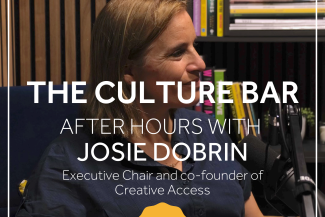In this Culture Bar Podcast, we are delighted to welcome Executive Chair and co-founder of Creative Access, Josie Dobrin to the studio. We talk about the partnership between Creative Access and the HP Foundation, key issues facing inclusivity in the music industry and what individuals can do to help.
Josie was interviewed by HarrisonParrott’s Digital Communications Officer, Lauren O’Brien.
After Hours chats are a spin-off series from The Culture Bar, discussing issues relating more broadly to the arts and culture sector.
This podcast was recorded on 12 July 2023.
The Culture Bar is a podcast series created by HarrisonParrott focussing on conversations in culture and the arts.
Find us on Spotify, iTunes, Google Podcasts, YouTube, Podbean, Deezer, Stitcher, Pocket Casts and all good podcatcher sites.
Use #theculturebar or follow us on Twitter @_TheCultureBar to keep up with our latest releases
Find out more about Creative Access here: website, Twitter, Instagram.
